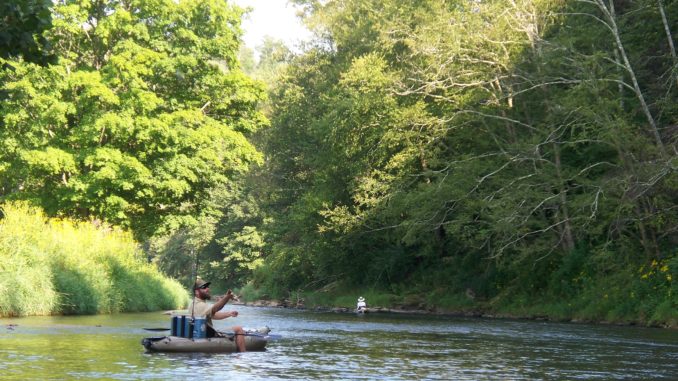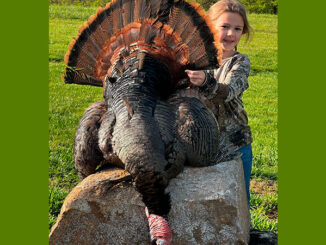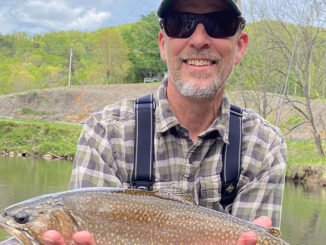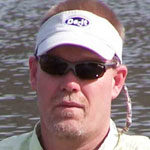
Fly-fishing tackle or ultralight spinning gear is perfect for river smallmouth.
Staring intently at the swirl along a grass line, Michael Garet of Fleetwood deftly swept his fly line up at a sharp angle and laid a hairy popping bug three feet to the right of a boulder protruding from the bank of the New River. Two twitches later, the bug was inhaled from below, not with the soft slurp of a trout, but with an aggression that could only be attributed to a smallmouth bass.
Hauling back on his fly rod, Garet, a product rep for Hobie kayaks, set the hook and began stripping line and pedaling to maneuver both his boat and the fish into open water. After two strong runs and a half-hearted slap at the boat, Garet reached down to lip the fish and remove the hook.
“One of the big reasons I really like the fly rod is most of the topwater action here is going to happen close to the banks,” Garet said. “The other reason is because if I do get a strike and miss, I can pick up the entire fly line and put that bug right back down where that strike happened. I think that’s a huge advantage of having fly tackle versus having to reel a bait all the way back in and then cast again.”
When it comes to smallmouth bass, western North Carolina has more than it’s share of great fishing venues to choose from in terms of rivers alone. With the rise in popularity of canoes and kayaks, today’s fishermen can launch a plastic boat at a number of roadside locations and float long stretches of these rivers, giving them a shot at as many smallmouth holes as they can stand in a day’s fishing.
“Probably the best river, is going to be the New River — the South Fork of the New River all the way up to the confluence with the North Fork and then from there, the actual New River as it flows into Virginia. It’s some fabulous smallmouth water,” said Garet. “The French Broad River is another. A lot of good quality smallmouth come out of the French Broad, and there are multiple put-ins and take-outs all the way from Asheville to Hot Springs.”
Other rivers that rank high on Garet’s list are the Little Tennessee and Hiwassee in the mountains and the Uwharrie as it drains the Piedmont before emptying into the upper end of Lake Tillery. All of these locations provide good access to the water, with kayakers and canoeists needing only a bridge crossing or highway right-of-way to launch their watercraft.
Once in the river, the art of “reading water” and a certain amount of trial and error takes the place of relying on sophisticated sonar electronics to locate fish. Garet suggests that pin-pointing likely smallmouth holding spots is similar to reading trout water.
“Target all of the pocket water in an eddy,” he said. “If there are exposed rocks, definitely try the pocket water directly downstream of that rock and the entire eddy line all along that area. If I’m primarily going after topwater, I’m going to be throwing a popping bug as close to the grass as possible. The water temperatures in June and July are perfect for smallmouth to really start aggressively feeding on topwater.”
Garet’s topwater arsenal includes an array of thumb-sized balsa popping bugs. He’s a fan of Todd’s Wiggle Minnow but pointed out that any cup-faced popping bug might work well. He’ll also be equipped with a couple of spinning rods, indicating that spinning tackle makes a great search tool. He’ll float perpendicular to the bank, going with the current and cover a lot of ground.
“The other thing I do, which is probably the most preferred method by most anglers, is casting a eighth- or quarter-ounce Roostertail on a lightweight spinning rod. Dark colors with a gold blade work best for me,” he said. “I rarely anchor. instead, I like to drift where I’m facing the bank, drifting at a 90-degree angle to the current trying to cast just slightly downstream so I can slowly pop that bug or work the spinner back towards me before I start getting lined up for the next cast.”








Be the first to comment